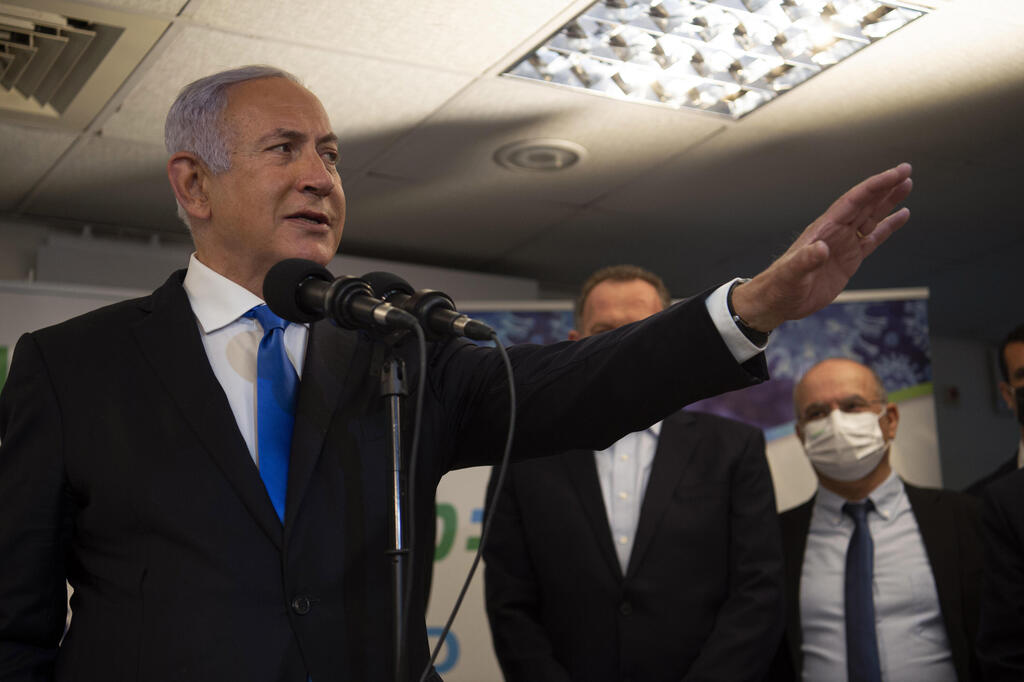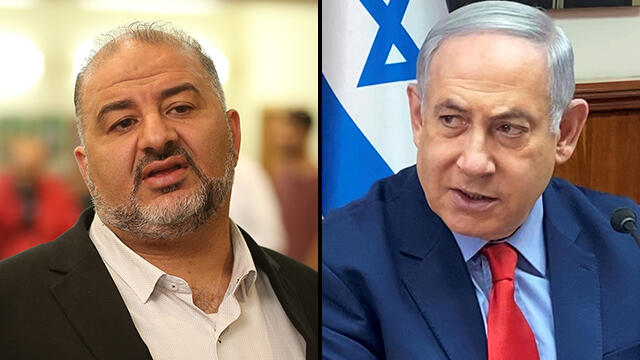Israel’s fourth election in two years is fast approaching, and among the most notable changes in the current political landscape, compared with previous rounds, aםppears to be the willingness of the Zionist parties, on the right, left, and center of the political spectrum, to embrace and accept non-Zionist Arab parties as legitimate partners in future coalitions.
Opposition Leader Yair Lapid announced last week he had “absolutely no problem” with establishing a government that would include the Joint Arab List – currently the only party in the Knesset whose voters are chiefly Arab Israelis.
6 View gallery


Benny Gantz and Yair Lapid in the Knesset before their acrimonious split last year
(Photo: Alex Kolomoisky)
Lapid, leader of the center-left Yesh Atid party who in the past three election rounds ran jointly with Blue & White under Benny Gantz, claimed he supported cooperating with Arab lawmakers last year during the latter's failed attempts to form a coalition.
He went on to accuse Gantz - who went from partner to bitter rival when he announced in April that he was joining Netanyahu's government - of failing to form a coalition of his own due to his refusal to unite with the Joint List.
Yet while Lapid’s latest claims do not quite match his rhetoric from a year ago, his new strategy of inclusion nonetheless garnered praise from left-wing pundits and Arab Israeli activists.
“He wouldn’t have dared to utter those words last year. That’s quite a statement,” says Zouheir Bahloul, a prominent figure in Israel’s Arab community who served as a Knesset member for the Zionist Union from 2015 to 2018.
“Lapid went further than even [the late prime minister Yitzhak] Rabin did in 1992. To include Arab parties in the coalition? The search for votes makes people say the darnedest things.”
6 View gallery


Prime Minister Benjamin Netanyahu speaking at a health fund clinic in Nazareth
(Photo: EPA)
The opposition leader was hardly alone in his plea to Arab voters. In recent days, hardcore right-wing parties such as Gideon Saar’s New Hope and Naftali Bennett’s Yamina vowed to include, or at least seriously consider, Arab lawmakers in their lists of nominees for Knesset.
The latest trend is a far cry from the campaigns of just a year ago, in which nearly all parties running for Knesset, from the deep right all the way to the center-left, denounced the Joint Arab List as terrorist sympathizers, and ruled out any political cooperation with Arab lawmakers.
The breathtaking about-face was made possible by none other than Prime Minister Benjamin Netanyahu himself, long accused of sounding racist dog whistles and disseminating outright anti-Arab propaganda.
In recent two weeks, the prime minister visited three Arab villages and towns, stressing the importance of Jewish-Arab alliance and posing for photo ops with Arab citizens receiving coronavirus vaccinations.
6 View gallery


Prime Minster Benjamin Netanyahu congratulates Jabarin Muhammad, the millionth Israeli to receive the Pfizer vaccine in the Arab city of Umm al Fahm
(Photo: GPO)
“There are two parallel moves here,” says Amjad Shbita, co-executive director of Sikkuy ‑ The Association for the Advancement of Civic Equality.
“[Netanyahu] wants to sow division and discord inside the Joint List, to pull the voting percentage among the Arab population down. At the same time, he wants to bring into his Likud party at least some of the thousands of Arab voters who, last election, voted for center-left parties, which now are powerless or disintegrating, like Blue & White and Labor. That’s a significant number of votes.”
Shbita believes that while the prime minister has expressed hopes of attracting votes worth at least two Knesset seats from the community he so openly railed against in the past, the number of Arab citizens who will actually cast their ballot in his favor will not exceed several thousand.
As to the dire situation of the Joint List, an alliance of four smaller parties that currently seems decimated due to internal turmoil, Shbita advises patience.
“It seems like the List has lost a third of its voters, but we’re really early into the race,” he says.
“The lists haven’t been finalized. The arguments this time seem to be about true ideology and substance, not political haggling over seating and rank like last time. That may actually bring more people out to vote. Also, the Arab vote has consistently been under-polled, by two to three seats on average.”
Netanyahu’s surprising romance with the Joint List, while now aggressively publicized by the prime minister himself, is anything but new.
6 View gallery


Joint List MK Mansour Abbas, left, has called for cooperation with Prime Minister Benjamin Netanyahu
(Photos: Reuters, Elad Gershgoren)
In recent years, Netanyahu has secured a number of crucial votes by secretly appealing to Arab lawmakers, including appointing his desired state comptroller and disbanding the Knesset at his pleasure.
These actions of Netanyahu the politician have clashed with the words of Netanyahu the campaigner, who in past election cycles warned his supporters that “Arab voters were coming in droves to the polls,” and sent a text message to his millions of followers saying “the Arabs want to annihilate us all – men, women and children.”
After the March 2020 elections, Netanyahu said that any government headed by his opponents that leaned on the support of the Joint List would be illegitimate.
"His latest actions are nothing more than a cheap and transparent political stunt,” says Bahloul dismissively. “He’s consistently attacked and slandered the Arab leadership, calling them terrorists. And now he suddenly realizes the importance of cooperation and camaraderie?”
6 View gallery


Joint List leaders heading to meet with President Reuven Rivlin to recommend Benny Gantz as prime minister after the March 2020 elections
(Photo: Reuters)
Bahloul, who quit the Knesset after it passed the controversial Nation-State Law and what he described as feeling unwanted in his own party, nevertheless gave Netanyahu credit for his political acumen.
"He knows the Arab public is experiencing one of its worst periods yet,” the former lawmaker says of the prime minister, noting the record-breaking surge in murders and other violent crimes among Arab Israelis over the past few years.
“He identified that vacuum of leadership. He sees the people are looking for someone who has the power to affect change, who has the political resources to change their lives for the better. Some will definitely answer his wooing, especially during this ongoing crisis.”
Analysts and pollsters agree that the priorities of the Arab population have shifted, with the Palestinian issue and the question of Jewish-Arab relations giving way to more pressing matters such as unrelenting economic woes and rampant violence and crime.
“Ideology has taken a backseat to practicality,” Bahloul says.
6 View gallery


L-R: Blue & White chief Benny Gantz meeting with Joint List leaders Ayman Odeh, left, and Ahmad Tibi after the March 2020 elections
(Photo; Ofek Avshalom)
As for whether Netanyahu’s sudden embrace of the Arab vote will backfire on him, in the form of a left-wing government that includes Arab representatives, the experts are split.
“There is some risk in this maneuver,” Bahloul admits. “When you open Pandora’s Box, you can’t tell how it’ll close. Maybe this will put the Arab voice center stage, make it legitimate to deal with them politically. Lapid’s words on Saturday were a shining example of that.”
Shbita is not as hopeful.
“The reason Netanyahu is doing this is that he knows there is no chance of a government leaning on the Arab bloc," he says.
"Even if Saar, Bennett and the others would want to form that kind of coalition, which is far-fetched, I doubt the [Joint Arab] List would agree to it after they were betrayed and burned by Gantz, Lapid and the rest during last year’s negotiations.”

